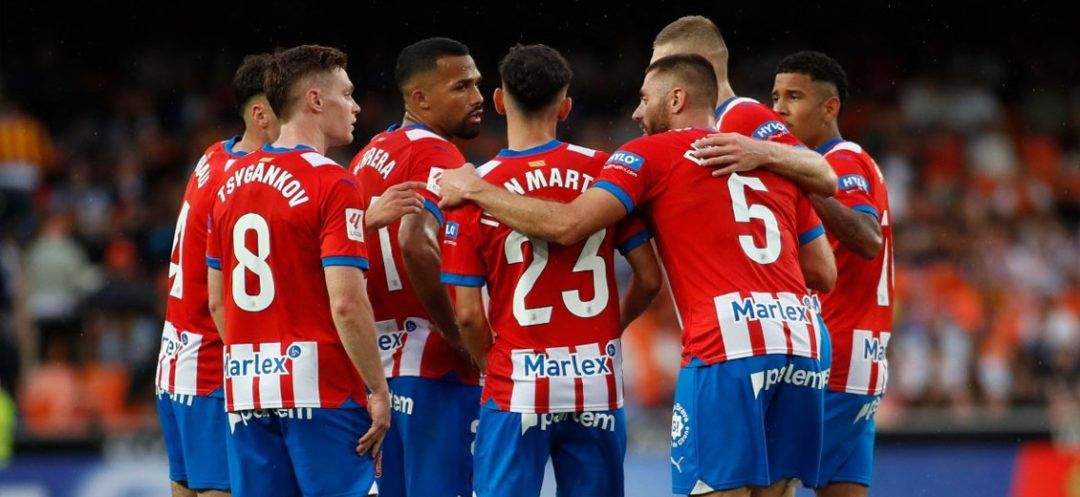
As Leverkusen’s run will forever be remembered as exciting and entertaining, other teams in Europe have also been able to defy the traditional top 4, such as the Spanish club of Girona.
Although this team may not have achieved the same level of success as Leverkusen, their season has been nothing short of impressive, warranting analysis to understand what led to these results.
A New Horse in the Race
Every year, the Spanish title is disputed between Real Madrid, Barcelona and Atletico Madrid. The last time none of these three won the La Liga title was back in the 2003-2004, when Valencia clinched the championship by 5 points.
This time around, the title was also contested between the usual top three. However, a new team entered the race, and very unexpectedly, kept up with the biggest teams in Spain all season long: Girona FC.
Girona’s exciting attacking style of football took the Spanish league by storm, masterminded by the great tactics of their coach, Míchel. Two years ago, the club was not even in this league. In the following season, they earned a respectable 10th place finish. Today, they secured the 3rd place in La Liga and therefore a Champions League spot for the 2024/2025 season.
What propelled Girona from a top 10 to a podium finish in La Liga is undoubtedly their impressive transfer window. They signed players that proved to be decisive to their season, such as Savio, Eric Garcia, Pablo Torre, Daley Blind, Gazzaniga and Dobvyk, all brought in for only $22 million.
With these players, Míchel build a unit similar to Leverkusen, a team continually rotating throughout the match, depending on the situation. However, what differentiates Girona from the German champions is the complexity of their tactics, especially in the midfield.
Street Football
While this analysis may look technical, it is important to understand the way Girona team members play, as their whole performance is based on a dynamic system that helps their offense flow smoothly.
When the Catalonian club is in possession, the team tends to form a back three, while the left back moves forward into the midfield, overloading the opponent. This midfield, orchestrated by the presence of Aleix Garcia, resembles the system Pep Guardiola implemented in his Man City squad.
Girona’s asymmetrical shape leaves their opponents wondering how to press them, which helps them progress through the field rapidly and attain the goal with a few passes. This setup helps the players show their individual strengths while moving forward as a team, as if they were playing street football together.
At first glance, this structure may seem confusing. However, with each of Girona's matches, this system seems more and more logic, given that it has helped them score the most goals in this La Liga season.
The 'Sister Company'
However, Girona’s success on the pitch has had a lot to do with outside affiliations, especially with Manchester City. In 2015, Pep Guardiola’s brother, Pere, took over the club since it was struggling with some financial debt. Shortly after, in 2017, the club was bought by City Football Group, a company encompassing many teams such as Man City, New York FC and Melbourne City FC.
This group inevitably helped the Spanish club, with Man City recruiting some players and then sending them on loan to Girona to develop them, consequently helping the team grow. While this system was not immediately effective for Girona following their relegation in the season of 2018/2019, it helped them in the long run, benefiting from the financial support of the City Group.
This takeover justifies how a team that was in debt some years ago can now afford to buy many important players. Nevertheless, Girona’s recruitment should not be overshadowed, as money does buy players, but it cannot specifically find the required players to fit a complex system. We can take, for example, Man City and Chelsea, which both have exorbitant transfer spending, but one of them sits at the top of the league and the other occupies the sixth position. In this context, Girona has often been dubbed "the Spanish Man City."
Given this financial backing and a great coach to lead a team full of talented young players, Girona is set to become a Spanish powerhouse over time, following its qualification to the Champions League next season, a feat that the team only dreamt of achieving a couple of years ago.
With this series coming to a close in the next part, two teams remain uncovered: Bologna and Aston Villa. These two clubs have combined, similarly to Leverkusen and Girona, a good long-term vision and an attractive play style, which eventually propelled them to the top in their respective leagues.
[readmore url="https://thisisbeirut.com.lb/sports/258082"]
Read more





Comments